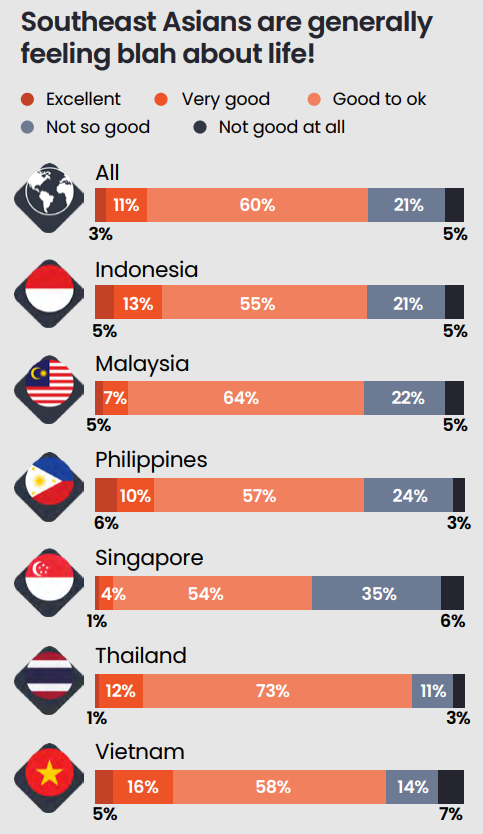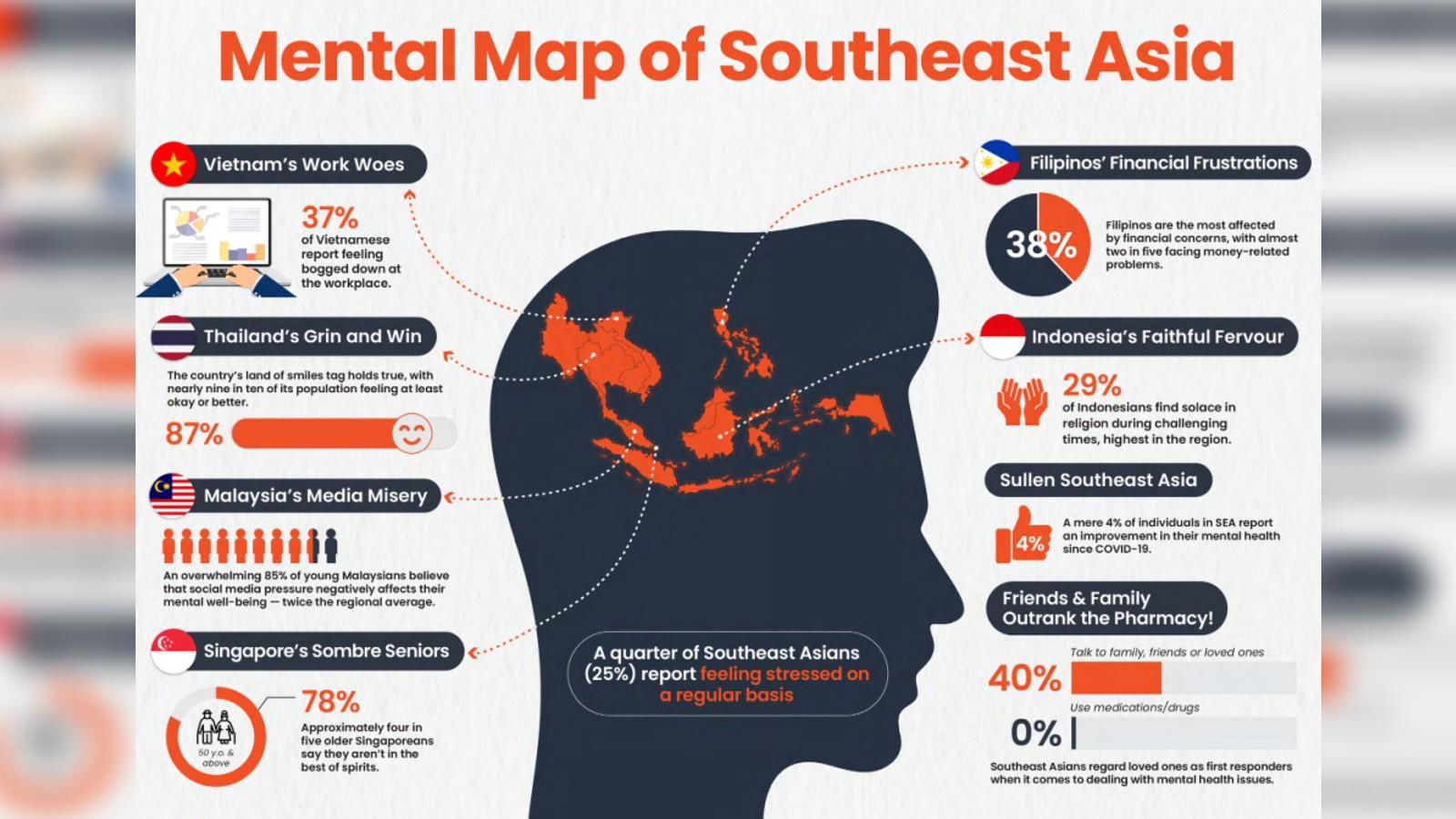share on
When seeking help for their mental wellbeing issues, 73% of the respondents said they approach their work colleagues or friends from school, while 22% turn to HR/their employer.
Singaporeans may be the unhappiest of the lot among Southeast Asians, according to recent research.
The research by Blackbox Research in collaboration with Audience-DNA, published in the Unmasking Mental Health report, looked into the intricate layers of mental health perceptions and awareness in Southeast Asia, based on an ASEAN-wide survey conducted in August-September 2023. More than 9,000 respondents from Singapore, Malaysia, Thailand, Vietnam, Indonesia, and the Philippines were involved in the survey.
When asked about how they would describe their current mental wellbeing, the majority (60%) of respondents expressed a state of mental wellbeing ranging from 'good to okay,' while 26% voiced a sentiment of a 'not-so-good' to 'not good at all' state. Beneath the overarching majority, a further detail emerged— almost four in five (78%) Singaporeans aged over 50 disclosed a 'not-so-good' mental state, making senior Singaporeans the most unhappy seniors across all of Southeast Asia.
By specific markets, the research highlighted that Thailand seems to live up to its "Land of Smiles" moniker, with nearly nine in 10 (87%) saying they feel at least okay or better. On the other end of the spectrum, two in five (41%) Singaporeans chose the 'not so good' to 'not good at all' options.
The full data per country involved in the survey is as follows:

Factors influencing mental wellbeing
Looking at the factors that come into play, cash crunch and work woes came up as the top two concerns on the minds of those surveyed. In particular, 31% of respondents resonated with financial pressures as a prevailing concern, followed closely by 27% who resonated with work-related pressures and career challenges.
In a particularly noteworthy finding, Southeast Asians aged 35 to 49 emerged as the group most under pressure in the workplace, with almost half of respondents in that age group (45%) noting work woes as a primary factor in degrading their mental health.
Delving deeper, the research sought to identify recurrent emotions that underpin individuals’ mental landscapes. As revealed, stress and the shadow of dwindling work motivation emerged as steadfast companions, voiced by 25% and 23% of respondents, respectively.
"These overall findings belie a more complex narrative when we look at the generational differences," it was noted. For instance, as elaborated, when it comes to Gen Zs (aged 15-24), who may be still studying or just starting out in their careers, financial considerations are not the top priority – instead, social media pressure is a stressor for them.
It does not stop there, with the research uncovering more factors contributing to individuals' mental unwellness, in addition to social media pressure:
- Not having enough money to engage in personal interests
- Reading about bad news
- Failure to meet personal goals
Digital/device addiction also made it to the list, with one-third of those surveyed in the 15-24 age group citing it as among the top two major factors impacting their mental health. In fact, 'deliberately avoiding social media' was among the top choices this same age group, when asked about what they consider as the best way to deal with mental health issues.
In further worrying findings, 85% of Malaysian youth felt that social media pressure affects their mental health—twice the overall average of 41% among young people across Southeast Asia.
How Southeast Asians are navigating their mental health & wellbeing issues
In lieu of the findings above, the research looked into how individuals surveyed sought help with their mental wellbeing challenges. Among all, 73% of the respondents said they approached their work colleagues or friends from school. The remaining approaches cited were:
- Friends: 60%
- Employer/HR: 22%
- No one: 21%
- Online communities: 2%
- Romantic partner: 1%
- Wellbeing/mental health professional (e.g. life coach, counsellor): 1%
What was most noted in the research was that not a single respondent turned to medical professionals or doctors for assistance, and neither did they choose to take medication—a point that, as highlighted in the report, showcased the trust placed in peers as a primary pillar of support.
Next, the respondents were also asked about the most effective ways to address mental health-related issues. In total, two in five (40%) reiterated the significance of connecting with their inner circle—family, friends, or loved ones. This choice was more prominent among Vietnamese respondents, with half of them (50%) selecting this option.
The survey also unveiled that religion and spirituality play a crucial role in the mental wellbeing of Southeast Asians, with 15% of participants across the region emphasising its significance.
Finally, 12% of respondents recognised the importance of regular sleep routines in addressing such matters.

So, what is HR's role in this?
As affirmed in the report, the insights gleaned should echo across boardrooms, promoting a re-evaluation of how companies approach employee wellbeing—and this is where HR comes to the forefront with a key role to play, seeing that HR's capacity to create a workplace that prioritises mental wellness is increasingly a determining factor in talent retention and overall company success.
Noted above, 22% of Southeast Asians surveyed actively seek assistance from their employer or HR departments when faced with a mental health issue. Looking further, among individuals aged 35 and above, one in three engage with HR, indicating a relatively higher level of interaction in this age group. However, this engagement markedly declines within the younger demographic, with only 13% of those aged 25 to 34 years accessing HR support.
"This disparity prompts questions about whether there has been a recent and drastic decline in employee trust in their employers or if the younger generation tends to be more sceptical in their approach," the report detailed.
In that vein, the report noted some of the ways HR can take charge of the matter:
- Enable a culture of acceptance and understanding, so employees can feel more comfortable seeking help without fear of judgement.
- Be an active champion of awareness campaigns, training sessions, and initiatives that educate the workforce about mental health issues, symptoms, and available resources.
- Advocate for flexible work arrangements such as remote work options or flexible work hours, recognising that work-related stress can be exacerbated by long commutes and a lack of work-life balance.
Lead image & infographic: Provided by Blackbox Research
share on

